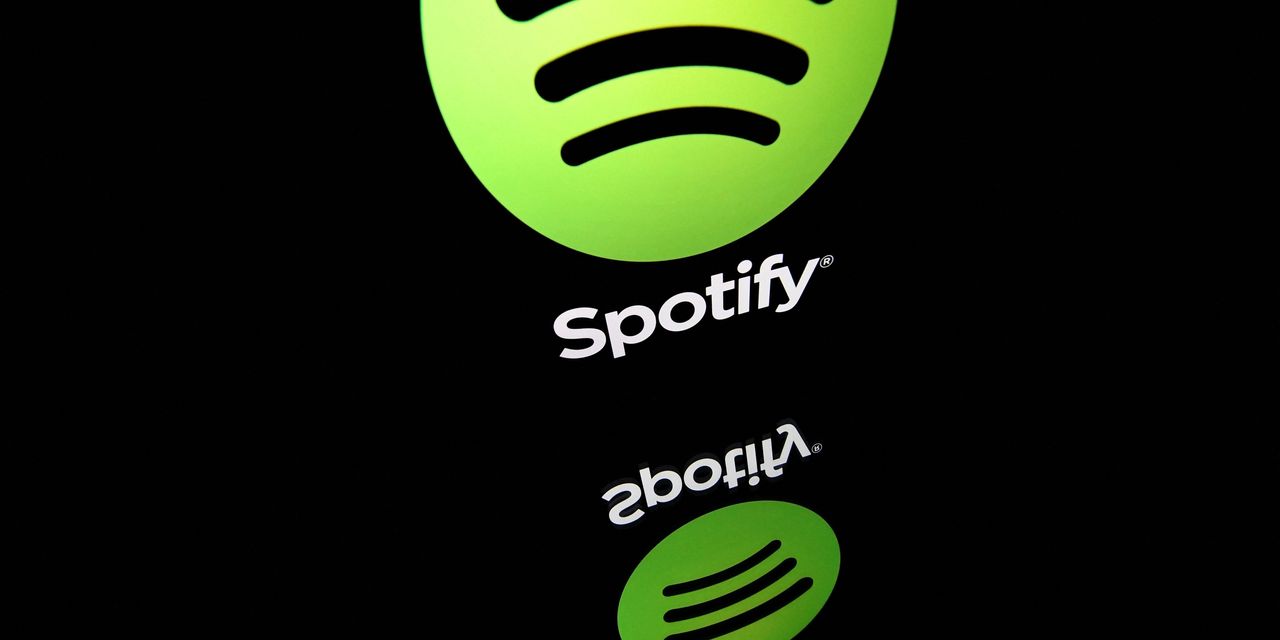Spotify Technology S.A. Chief Executive Daniel Ek on Tuesday floated the possibility of raising prices in the U.S., after the music-streaming service forecast weaker margins following a slowdown in advertising growth.
Ek, during the company’s earnings conference call, said he believed Spotify
SPOT,
had “significant pricing power,” thanks in part to lower churn than rivals, such as Apple Music, which recently raised its own streaming prices.
“Again, in specific, mostly to the U.S.-based price increases, it is one of the things that we would like to do, and this is a conversation we will have, in light of these recent developments, with our label partners,” he said.
But shares took a hit after the company’s forecast and a bigger-than-expected third-quarter loss. The Luxembourg-based company reported a third-quarter net loss of 166 million euros ($165.5 million), or 99 euro cents per share, compared to a profit of 2 million euros, but a 41-cent per share loss, in the prior-year quarter.
Sales came in at 3.036 billion euros, or $3.03 billion, compared to 2.501 billion euros in the year-earlier period. Gross margin came in at 24.7%.
“Gross margin came in below expectations, mainly due to an
unfavorable adjustment to prior-period estimates for rights-holder liabilities,” Spotify executives said in the company’s earnings materials. “We also saw a margin impact due to slower-than-forecast advertising growth given the challenging macro environment.”
The company finished the quarter with 456 million total monthly active users and 195 million premium subscribers.
Analysts polled by FactSet expected Spotify to report a loss of 84 cents per share, or 85 euro cents, on revenue of $2.982 billion, or 3.017 billion euros. They forecast premium subscribers of around 194 million, and monthly active users of around 449.4 million.
For the fourth quarter, Spotify forecast sales of 3.2 billion euros, compared to FactSet estimates of 3.209 billion euros, aided by a favorable foreign exchange rate. Spotify also said it expected gross margins of 24.5%, a reflection of podcast revenue offset by “investments in non-music content and product enhancement initiatives.”
Spotify said it expected 202 million total premium subscribers, roughly in line with FactSet estimates, with total monthly active users of 479 million. FactSet foreacst 470.68 million.
Shares fell 5.7% after hours on Tuesday.
Ahead of the earnings, analysts were on the lookout for any details on digital-ad spending and subscriber growth amid concerns about a recession. Wall Street was also trying to gauge user interest in Spotify’s podcasts and audiobooks, as big investments in those categories weigh on profits.
Analysts have also narrowed their focus on the company’s margins, hoping for better results in the year to come.
“We think the company has to show real margin progress/evidence for the stock to work,” Truist analyst Matthew Thornton said in a research note this month.
Raymond James analysts, in a note this month, said that this year was “the peak year of investment in original podcasting content,” which could ease some pressure on margins. But they said investments in audiobooks might offset the pullback in podcast spending.
Spotify Chief Financial Officer Paul Vogel, during a conference in September, said advertising was “a bit up and down right now,” a trend that continued through the third quarter after a slowdown in the last two weeks of June. But he remained upbeat about the company overall.
“We’re fully aware of what’s going on globally,” he said. “But luckily for us, it hasn’t impacted our numbers at all.”
Spotify Chief Executive Daniel Ek, during Spotify’s last earnings call in July, said that “while the macro environment continues to present uncertainty, we’re currently not seeing any material impact on our expectations for users or subs growth from the economic downturn.” Still, he noted that Spotify had cut its hiring by 25%.
Spotify could also face more competition from TikTok parent ByteDance, the Wall Street Journal reported this month.
Hollywood mogul Ari Emanuel, in a Financial Times op-ed this month, called on Spotify and other businesses to stop working with rap megastar Kanye West, following West’s recent antisemitic remarks. The platform faced previous criticism after landing a big podcasting deal with Joe Rogan, as well as from artists, who say streaming services pay too little.
Spotify stock is down 58% year-to-date. The S&P 500 Index
SPX,
by comparison, has fallen 19% over that time.
